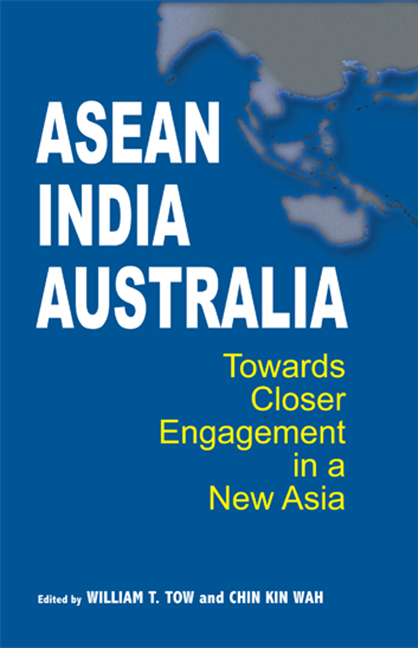Book contents
- Frontmatter
- Contents
- Preface
- Contributors
- List of Abbreviations
- Introduction
- Part I Emerging Regional Security
- Part II Energy Security
- Part III Climate Change
- Part IV Maritime Security
- Part V Law Enforcement/Combating International Crime
- 17 Implications of the Growing Prevalence of Interregional Crime for Cooperation in the Asia-Pacific Region
- 18 Australian Perspectives on Regional Law Enforcement: Issues and Challenges
- 19 Countering International Crime in an ASEAN Context: Singapore's Perspective
- 20 Indian Perspectives on Law Enforcement against International Crime
- Conclusion
- Bibliography
- Index
19 - Countering International Crime in an ASEAN Context: Singapore's Perspective
from Part V - Law Enforcement/Combating International Crime
Published online by Cambridge University Press: 21 October 2015
- Frontmatter
- Contents
- Preface
- Contributors
- List of Abbreviations
- Introduction
- Part I Emerging Regional Security
- Part II Energy Security
- Part III Climate Change
- Part IV Maritime Security
- Part V Law Enforcement/Combating International Crime
- 17 Implications of the Growing Prevalence of Interregional Crime for Cooperation in the Asia-Pacific Region
- 18 Australian Perspectives on Regional Law Enforcement: Issues and Challenges
- 19 Countering International Crime in an ASEAN Context: Singapore's Perspective
- 20 Indian Perspectives on Law Enforcement against International Crime
- Conclusion
- Bibliography
- Index
Summary
INTRODUCTION
International crime, or transnational crime, often perpetrated by organized crime syndicates, is a concern faced by many countries, particularly in the lucrative areas of drug trafficking, arms smuggling, money laundering, and trading of counterfeit goods. The problem has grown exponentially in recent years with increasingly open borders, faceless methods of transactions, and developments in technology that enhance the speed of illegal trading. Economically, transnational crime undermines the legitimate business environment of countries and results in revenue loss for states as well as corporate entities. Geopolitically, transnational crime can sharply challenge both the institutional capacity and social cohesion of both developed and developing states. In this context, the governments of Australia and India, along with those of the ASEAN member states, share a common concern in neutralizing transnational crime and in cooperating to erode its influence.
From a security perspective, any form of transnational crime that is left unchecked will ultimately erode the security of the country. To be effective and to evade law enforcement, organized crime syndicates will often find ways to compromise law enforcement officers to abet their offences. In order to achieve their economic objectives, crime syndicates will also not hesitate to use criminal means against innocent members of the public to coerce them into cooperation. In the process, many victims are created.
Migration and the growth of ethnic communities in other nations have led to the mushrooming of crime syndicates such as the East Asian gangs, traditionally located within East Asian countries, to take root on other shores, for example, in Vancouver, Canada, or Sydney, Australia. Notably, at the Interpol Global Conference on Asian Organized Crime held in Singapore in January 2008, more than 200 delegates from over thirty-two countries as diverse as Guinea and Belgium attended, indicating the international reach of those who have had to deal with such gangs.
Understanding the Challenge
Neutralizing transnational crime is hardly an easy task. The sheer diversity and flexibility of transnational connections offer criminal groups the often crucial advantage of being “one step ahead of the law”. It takes only seconds to wire money across borders, but it takes years to achieve a minimal level of consistency in legal systems amongst nation states.
- Type
- Chapter
- Information
- ASEAN-India-AustraliaTowards Closer Engagement in a New Asia, pp. 334 - 346Publisher: ISEAS–Yusof Ishak InstitutePrint publication year: 2009



